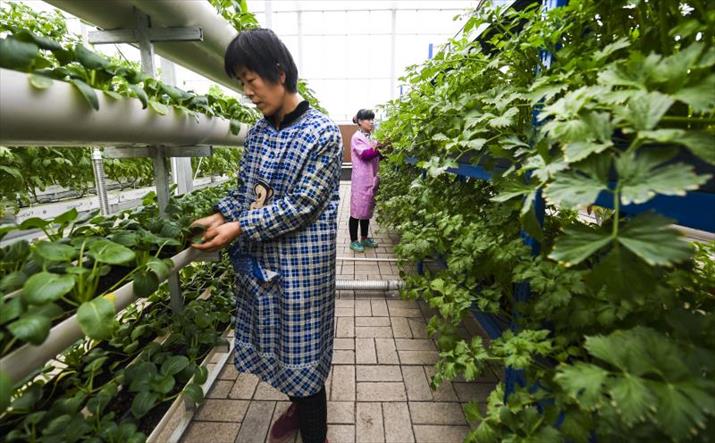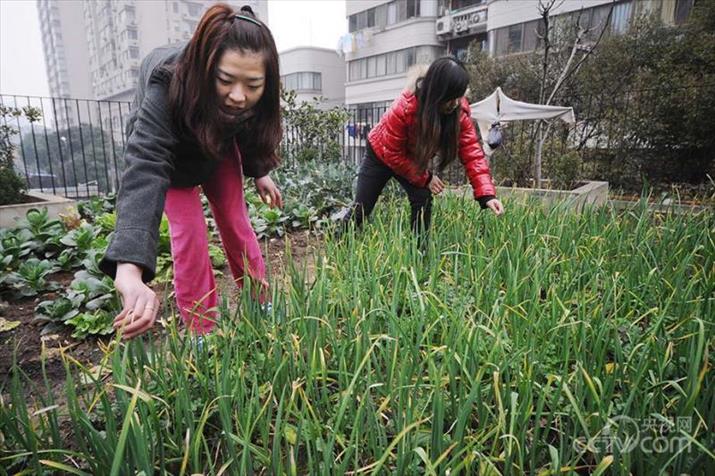|
||||||||||
| Home Nation World Business Opinion Lifestyle ChinAfrica Multimedia Columnists Documents Special Reports |
|
||||||||||
| Home Nation World Business Opinion Lifestyle ChinAfrica Multimedia Columnists Documents Special Reports |
| China |
| Growing Up |
| Urban farmers are turning China's concrete jungle into high-rise vegetable gardens |
| By Xia Yuanyuan ·2017-05-10 |

Since the dawn of Chinese civilization there has been an innate yearning for people to live an idyllic life surrounded by nature, far from the maddening crowds. This green dream has been filtered down through millennia to modern Chinese society now engaged in the age of technology in a maze of urban sprawls.
The scarcity of land in big cities has not diminished green dreams and instead of spreading outward, ambitions have scaled heights - quite literally.
Crops, vegetables and fruits are no longer the sole preserve of countryside farmyards. They can now be seen adding value to urban balconies and roof top gardens, a new experience for many city dwellers who use gardening as a way to unwind after a day's grind and learn something new.
Trimming plants in her garden in front of her Beijing apartment, Xiao Shujuan, 61, said, "I used to plant a lot of flowers. With a lot of idle flowerpots, I thought why not plant some vegetables." Since August last year, Xiao and her husband became addicted to planting different types of vegetables in their garden, including Chinese cabbage, lettuce, parsley, onion and garlic sprouts.
"The harvest is good. It can support at least half of our family's daily use," Xiao told ChinAfrica. "The green in front of my apartment gives me a feeling of nature, and I feel relaxed and pleased whenever I see my little farmland," she said.
With the great population density of China's big cities and rising housing costs, those like Xiao, with a love of growing things, are finding rooftops, balconies and window ledges to be treasured spaces for them to take up urban farming.
The joy of planting
Planting vegetables at home is not just for the elderly. It is fast becoming fashionable among young Chinese too. Young mother Ren Jing, 33, has converted a vegetable patch of just 1 square meter on her balcony into a vertical seven-tier shelf, with different vegetables growing on each shelf.
"It supplements my family's diet," Ren told ChinAfrica. "After planting these vegetables, my five-year-old son got rid of bad habits of picky eating. Now he loves vegetables."
People, especially children, in cities, know little about how vegetables are planted and where they come from. So urban farming is also about urban residents becoming more aware of the relationship between the planting and harvesting process, and the food they eat, by re-using fallow spaces in the city, including rooftops, balconies and window ledges.
"Planting vegetables at home can provide all families, especially my son, with a chance to connect with nature. Taking care of plants not only helps develop a child's sense of responsibility, but also stimulate their curiosity and imagination," said Ren.
Post-80s Sun Yali is also an urban farm fanatic. She updates her vegetable growth rate daily on social media. "I tried many times to grow vegetables and it cost me around 300 yuan ($43) on pots, seeds and organic fertilizer. In half a year, the vegetables I harvested are valued at less than 100 yuan ($14). But who cares, it brings me not only food but a sense of achievement and joy."
Modern techniques
It is not an easy thing to plant vegetables in cities as there is a big difference between rural and urban environment. Rural farming has special requirements in many aspects including soil, temperature and fertilizer, which cannot be easily found in urban areas.
But in recent years, many Chinese agricultural organizations have been providing solutions to support urban farming. Subsequently, agricultural experts at Daxing Agro-Technical Promotion Center in Beijing undertook a series of experiments to help develop techniques to support the growing urban farming trend.

"Our center made great achievements in promoting pot-grown vegetables," said Ha Xuejiao, a technician at the center. "We developed special fertile soil with a balanced proportion of organic fertilizer. This is convenient for those who know little about fertilization. Besides, the soil is insect proof, which is an advantage for urban use," she said. In addition, the center also provides technological guidance to urban farmers.
From 2009, Beijing Municipal Agro-Technical Promotion Center carried out a number of technical research programs to promote planting at home. It produced different planting containers for this purpose, such as wall-mounted pots, vertical column type shelves and multilayer shelving which is practical for urban apartments. In addition, the center also developed fast-growing vegetable seeds with long-term harvest. They simplify the planting procedures and make it easier for urban farmers to enjoy their planting experience.
Multiple benefits
Urban farming in cities also generates multiple benefits. For most city-dwellers, it is a way to harvest healthy food, following the scandals surrounding food safety in China. The entire process of reconnecting to nature, being aware of the origin of food and decreasing the "food miles" associated with long-distance transportation means the freshest food in season lands on urban plates.
In addition, with the help of these new green areas in gardens, on rooftops and balconies, a better urban environment is produced. According to Ha, these space-saving green places throughout the cities can add greenery, increase shade, and counter the unpleasant heat island effect where cities become much warmer than their surrounding rural areas because of the movement and activities of people.
|
||||||||||
| About Us | Contact Us | Advertise with Us | Subscribe |
| Copyright Beijing Review All rights reserved 京ICP备08005356号-5 京公网安备110102005860号 |